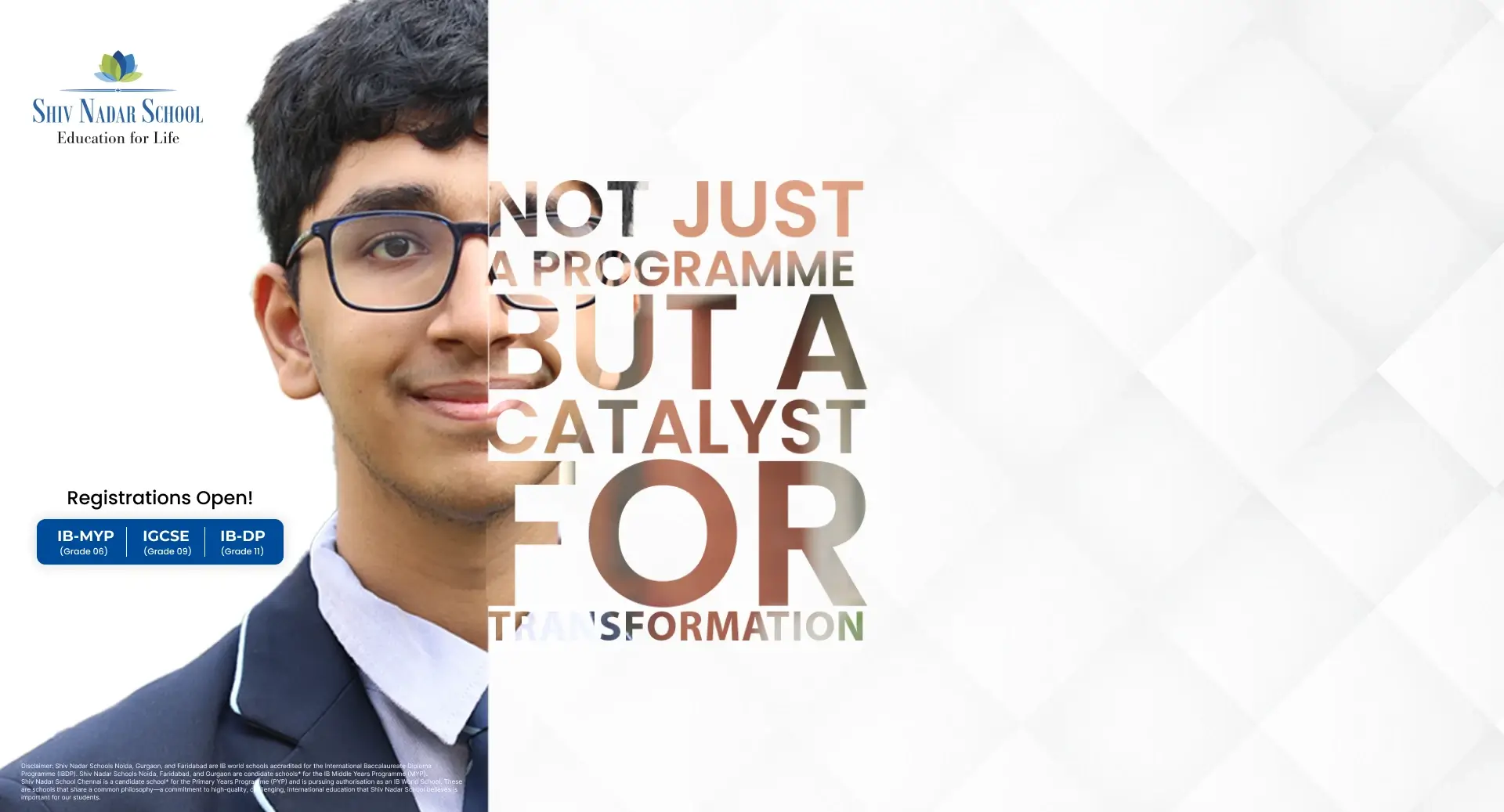
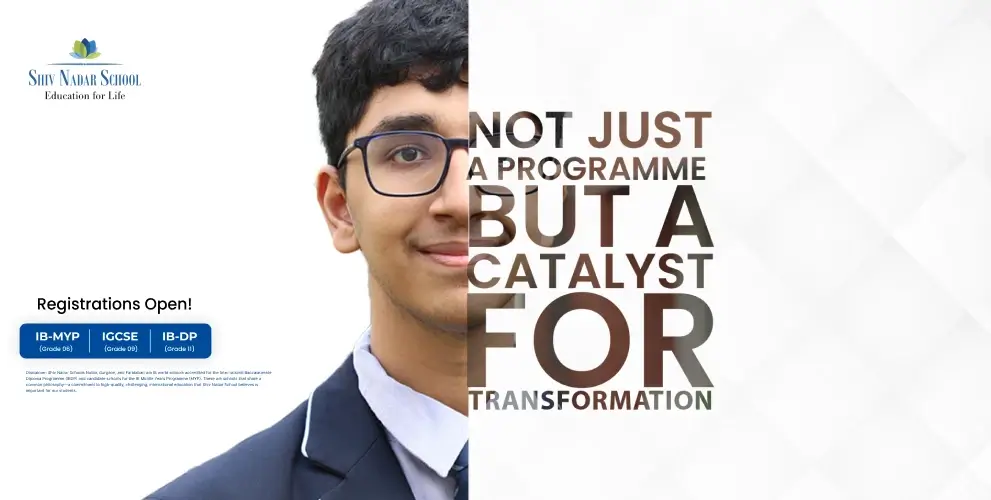
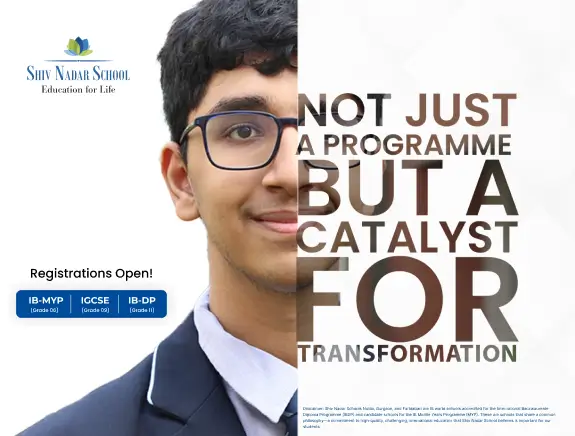
Our IB MYP program emphasises a holistic approach to learning, combining traditional subjects with personal development, global awareness, and critical thinking. We aim to nurture well-rounded, internationally minded students through interdisciplinary study, community involvement, and an emphasis on inquiry-based learning.
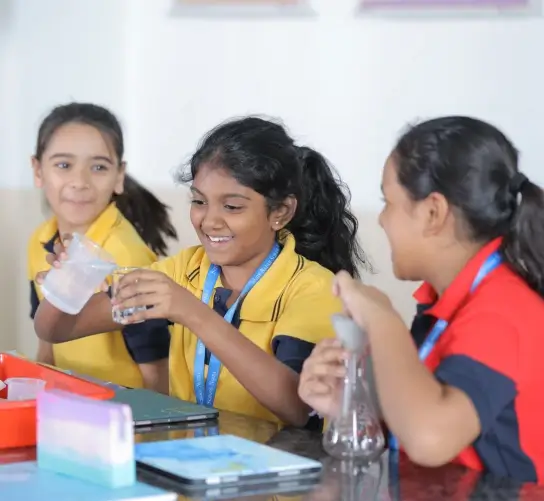
Our IGCSE Programme is guided by the Cambridge learning values rooted in academic rigour and the latest education research. We foster confident, innovative, and responsible students who are reflective and engaged through active and participatory learning. The programme challenges and stimulates students, preparing them for success in their academic and professional pursuits.
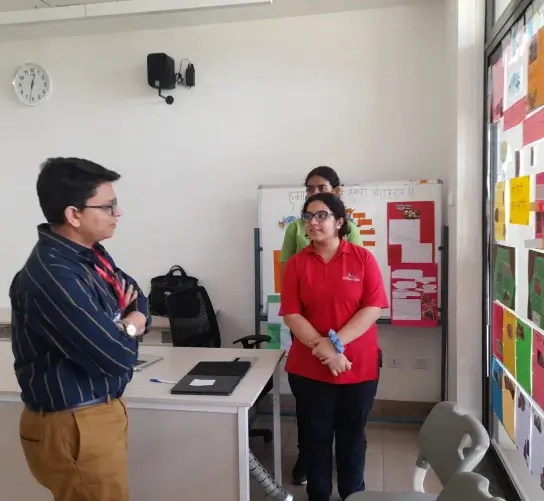
The International Baccalaureate Diploma Programme (IBDP) at the school is embedded in a comprehensive and diverse curriculum designed to address both local and global perspectives. This ensures that our students emerge as inquisitive, well-informed, and compassionate individuals who actively contribute to building a more harmonious world through their appreciation of different cultures and dedication to respect and understanding.
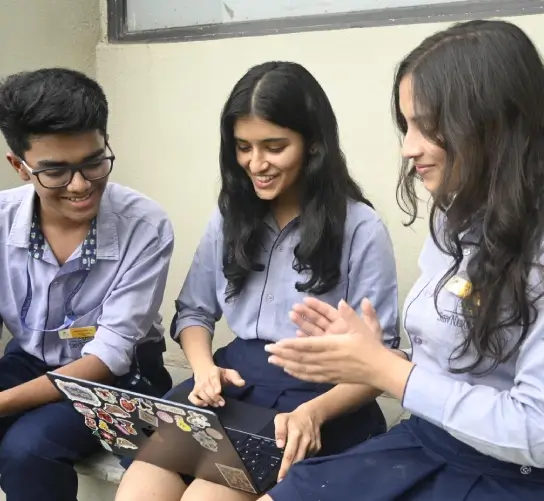
At Shiv Nadar School, we believe in and abide by a set of core values that reflect in, and govern every action of ours.
Integrity
Lifelong
Learning
Respect and
Compassion
Sense of
Purpose and
Responsibility
Openness and
Transparency
Commitment
to Excellence
At the Shiv Nadar School, learners are encouraged to discover their talents and abilities. The school's holistic approach to learning fosters a culture of creativity while enabling ethical and purposeful citizens of the global community. With a diverse range of subject offerings taught by expert IB and Cambridge educators, students have access to world-class facilities and resources, including 25+ labs and dedicated International Curriculum Wings. The school's experienced career counsellors help students identify their passions and strengths, guiding them towards career paths that align with their goals.
Seasoned and Trained
Faculty
Seasoned and Trained Faculty
Our team of 500+ educators delivers exceptional learning experiences with care, knowledge, and passion. Our IB educators have been trained in IB-recognised workshops and over 70% serve as IB examiners and workshop leaders. 90% of the IGCSE faculty is Cambridge-trained.
Dedicated Career
Guidance Centre
Dedicated Career Guidance Centre
Our team of experienced experts specialise in assisting students in selecting career paths that best match their intellect and interests. With diverse initiatives and competent guidance, our students have succeeded in acclaimed universities across 14 countries, including Yale, Cambridge, NYU, Penn State University and many more…
Purpose Designed
Infrastructure
Purpose Designed Infrastructure
The Shiv Nadar School offers well-maintained facilities with state-of-the-art technology, comprehensive libraries, arts and performance spaces, athletic facilities, and well-equipped science labs. The school prioritises safety, eco-friendly initiatives, and accessibility. Specially designed collaborative learning spaces and online learning resources enable students to thrive and excel in their academic and personal pursuits.
Learner focused
Pedagogy
Learner focused Pedagogy
Shiv Nadar School offers a rigorous, inquiry-based curriculum, promoting critical thinking and holistic development, including diverse subject combinations. A global outlook, cultural diversity, and community service enrich students' education, preparing them to become well-rounded, responsible global citizens.




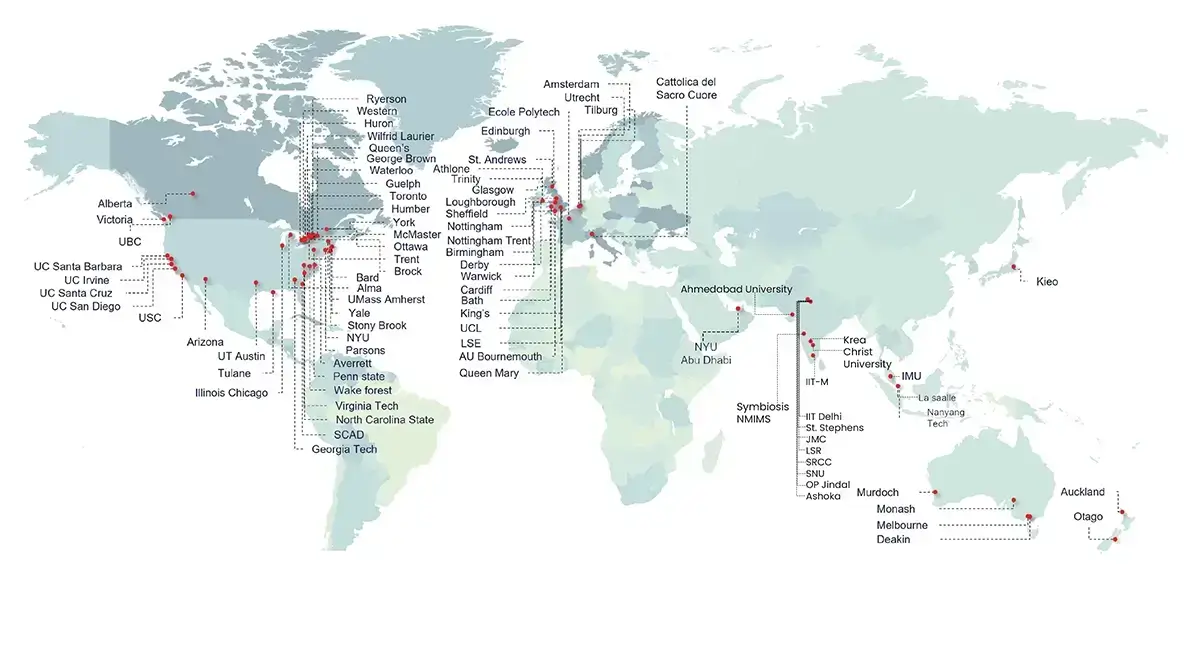
Students
Universities
Countries
Students in top 100 Universities
by overall ranking
Students in top 100 Universities
by subject ranking
IBDP Batch of 2024
IBDP Batch of 2024
IB MYP, Grade 6
IB MYP, Grade 6
IB MYP, Grade 6
IBDP, Batch of 2021
IBDP, Batch of 2021
IBDP, Batch of 2021
IBDP, Batch of 2021
IBDP, Batch of 2021
Mother of Abhyuday Chawla (IBDP - Batch of 2021)
Mother of Aryan Misra (IBDP - 2)
IB Parents
The IBDP programme is geared towards students aged 16 to 19 (Grade 11 and 12).
The IB Diploma Programme cultivates a spirit of inquiry and discovery, encouraging students to explore the 'why' behind what they learn rather than simply absorbing the information. Its balanced blend of Arts and Science subjects prevents early specialisation, while its global outlook promotes an understanding of different cultures. As a result, universities and employers recognise IBDP graduates as intelligent, organised and internationally minded individuals capable of the critical and creative thinking essential in the 21st century. A key feature of the Diploma Programme is its focus on the holistic development of each student. The learner profile and core elements are central to the programme, highlighting their significance. Core components like Theory of Knowledge (TOK), the Extended Essay, and Creativity, Activity, Service (CAS) enrich students' educational experience, challenging them to apply their knowledge and understanding to real-world situations.
The students have ample opportunities to explore their areas of interest, as the topics of investigation in the internal assessments depend on choices made by the students. Each student formulates the subject and topic of the extended essay based on their passions and abilities.
Shiv Nadar School’s IBDP offers diverse subject choices for the programme, emphasising the interconnectedness of diverse subjects and ensuring that students can pick combinations best suited to their interests. The Coordinator and the CGC team conducts sessions to help the students with their subject choice. Each student is required to study six subjects, ideally one from each of the six groups: Language and Literature, Language Acquisition, Individuals and Societies, Sciences, Mathematics, and the arts, along with 3 core subjects - EE, TOK and CAS. If anyone would like to drop the 6th group (The arts) there can be either two subjects from Group 3 and one from Group 4 or vice versa. The minimum number of subjects should be 6 with 3 HL’s and 3 SL’s. Even 4 HL’s and 2 SL’s are permitted.
The school is flexible and accommodates individual students, needs, and students have the option to change subjects in the first month of the academic year. The students can discuss the same with the coordinator, and based on the child’s preferences and interests, the changes can be made. The Coordinators and the CGC team take sessions to help students with their subject choice, ensuring students are comfortable with their chosen courses.
Students are encouraged and effectively supported to complete the Diploma programme. Students who do not meet the minimum requirement for the full diploma can appear as Course Candidates. Students can choose to study from 1 to 6 - IB subjects (SL or HL) and are not required to take up the core elements (EE, TOK, & CAS). For course candidates, there are no restrictions on the levels. For Grade 12 equivalence in India, students may choose to study 6 subjects (3 at Higher Level and 3 at Standard Level).
At the beginning of the year, the Foundation program helps the students get familiar with the required skills in the various subject areas. They get a sense of classroom experiences through interactive activities designed by teachers. The foundation program is used to familiarise them with the attributes of IB learners. Some students adapt easily, but usually, by the end of the first term, most of the students are seen to be much more comfortable! The duration of the MYP foundation program is 6 weeks, while the IBDP foundation program lasts for 4 weeks.
Shiv Nadar School places a strong emphasis on the high quality of its teachers. Our educators are carefully chosen, with many having prior IB experience. We've also been diligently preparing for the IB curriculum for an extended period, offering professional development and training to ensure our teachers are well-acquainted with IB's distinctive requirements and pedagogical methods. Each of our IB teachers has participated in at least one subject-specific IB training and one IB Pedagogical training; some have done more. The school is committed to delivering an exceptional educational experience through these measures.
The Career Guidance Centre (CGC) has a specialised team of experts that assists students in choosing career paths that resonate best with their intellect and interests. Our CGC counsellors incorporate a global perspective while guiding students and ensuring they choose from the best institutes worldwide. They organise workshops, psychometric evaluation, resume building, one-on-one counselling, documentation of achievements, subject choice seminars and sessions with qualified experts. Through their diverse initiatives and able guidance, our students have found themselves a home in acclaimed universities across 15 countries. Overseas University: Cambridge, Yale, Dartmouth New York University, UCL, University of Edinburgh, NUS, NTU, Parsons School of Design and Berklee College of Music amongst various others. Indian University placements: Krea, Christ University, IIT, OP Jindal, Ashoka University, Delhi University: St. Stephens, JMC, LSR, SRCC, Shiv Nadar University
The Association of Indian Universities (AIU) recognises the IB Diploma as equivalent to the 10+2 Senior Secondary School qualification, meeting the eligibility criteria for undergraduate admissions in India. The IB provides Indian equivalent percentages for IBDP grades for students applying to Indian universities.
The IB MYP is an internationally recognised educational programme designed for students aged 11 to 16 (Grades 6 to 10). It is one of the four programmes offered by the prestigious International Baccalaureate (IB) organisation. The programme bridges the gap between theoretical concepts and their practical application. It aims to develop an understanding of how subjects are interconnected while nurturing critical thinking, problem-solving, and reflective learning, enabling students to become independent learners who are better prepared for advanced academic work. The programme fosters a deeper understanding of the world, with its diverse cultures and communities. It also encourages students to apply their knowledge in new and unfamiliar situations, enhancing their adaptability and resourcefulness. Supported by continual research and improvement, the IB MYP programme remains up-to-date and relevant for today's learners.
The Association of Indian Universities, the Council for the Indian School Certificate Examinations (CISCE), the Council of Boards of School Education in India (COBSE), the Maharashtra State Board of Secondary & Higher Secondary Education, and several other educational authorities have granted the Middle Years Programme (MYP) equivalence to Grade 10.
The IB MYP offers an inquiry-based approach, emphasising critical thinking, creativity, conceptual learning and global awareness. It fosters interdisciplinary learning and aims to develop students into well-rounded, responsible individuals. The substantial difference between the different curriculums/programs lies in their educational philosophies, teaching methodologies, and assessment approaches, catering to diverse learning needs and goals. IB MYP assesses students through coursework and personal projects focusing on skills development, connecting classroom learning to the real world, and encouraging students to apply their knowledge creatively.
Shiv Nadar School offers a diverse and enriching subject stream experience in the IB MYP program, empowering students to explore their passions and develop a well- rounded skill set. The streams in the MYP cater to the unique interests and aptitudes of students, allowing them to delve deeper into specific areas of study while fostering interdisciplinary connections. From the sciences and humanities to the arts and languages, our streams provide a comprehensive educational journey that nurtures intellectual curiosity and holistic growth. MYP students need to select a second language since IB offers only 2 languages. Other than this, in each year of MYP, students have to do one unit on Interdisciplinary learning.

There are 8 subject areas in MYP:
In grade 9, students would have the following choices:
The choice of subjects will be a guided process in terms of academics and Career Guidance team.
MYP students engage in long-term projects:
Besides these projects, students are also engaged in MYP inquiry for various other subjects and create subject-specific projects too.
The International General Certificate of Secondary Education (IGCSE) is a globally recognised qualification developed by the University of Cambridge. It emphasises practical application, critical thinking, and a global perspective. IGCSE prepares students for future educational challenges by fostering in-depth subject knowledge, analytical skills, and independent learning, benefiting them for college admissions and beyond.
Cambridge IGCSE is a springboard to IBDP. Their skills in the IGCSE two-year program enable a smooth transition to IBDP. After the 2-year program, Cambridge learners are Confident in working with information and ideas. Responsible for themselves Reflective learners Innovative and equipped for new and future challenges. Engaged intellectually and socially, ready to make a difference.
Cambridge IGCSE prepares students for life, helping them develop an informed curiosity and a lasting passion for learning. Schools can shape a Cambridge curriculum around how they want their students to learn, helping them discover new abilities and a wider world. Cambridge students develop the skills they need to achieve at school, university and work. Our curriculum is flexible, challenging, inspiring, culturally sensitive, yet international in approach.
We value deep subject knowledge and the conceptual understanding that helps students make links between different aspects of a subject. We also encourage students to develop higher-order thinking skills – problem-solving, critical thinking, independent research, collaboration, and presenting arguments. These are transferable skills that will last a lifetime, preparing students for their future lives. They also make learning enjoyable and rewarding.
IGCSE is recognised by many Indian universities and boards. After completing IGCSE, students can transition to CBSE, CISC, or even pursue the IB Diploma. Many universities in India, especially private ones, welcome students with international qualifications. It is also recognised as a Class X qualification - one of the prerequisites for admission to undergraduate courses in India.
Many students transition from other curricula to the IGCSE. The school provides guidance to help students adapt to the new curriculum.